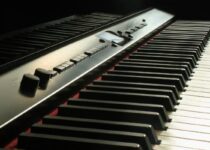There’s tons of technical information out there about all the different digital keyboard-type instruments, and it can be very helpful to understand the differences between them. Many things should factor into your buying decision, including the type of sound and how it is created, the touch and feel of the keys, and whether or not they have polyphonic notes.
However, the prevailing view is that digital keyboards are not and never will be as good as a traditional, old fashioned, wood-and-glue acoustic piano, no matter what type of piano we’re talking about. If you asked me ten years ago I certainly would have agreed. But nowadays, digital keyboard technology is so good that it really all comes down to personal preference and cost. So let’s compare.
Digital Keyboards vs Acoustic Pianos: When Digital is Better
Obviously a nine foot long Bosendorfer Imperial concert piano made in Austria and built with only the best materials is going to blow your socks off. I had a chance to play one during a concert in LA a few years ago. It was like an untamed beast. The sound was rich and dark, like the best European chocolate, but boy did I get a workout! The keys felt heavy and stiff, and honestly I had to work hard to get my best performance out of the instrument.
The next time I was hired to play for the same theater group I asked If it would be alright for me to bring my own digital keyboard instead. At the time I had a Kurzweil SP88. It had lovely sounds on board and the touch was just how I liked it. It was easy to switch between the different programs in the dark concert hall. Afterwards, everyone commented on how incredible the keyboard sounded.
So in the competition between acoustic piano vs keyboard it’s not always a simple choice, and the piano doesn’t always win. The example I give above illustrates that for my purposes in that particular small LA theater, the Bosendorfer was not the best fit. I also did a six week run at another LA theater and I had them move the large six foot Steinway off the stage so I could play my digital Yamaha. The Yamaha keyboard took up less space, I could see over to give cues, and it sounded incredible.
The Beauty of Acoustic Pianos vs Keyboards
Having said this of course I can also give you many examples of where the complete opposite has been true. There is nothing more moving than hearing the sound coming out of an acoustic piano in the studio that is properly mic’d and insulated.
I once had the opportunity to play on a session in a London studio a piano that had been played by John Lennon. It was pushed right back into the corner next to the vocal booth and looked like it had been run over by a truck. The finish was all crumbly and the keys were discolored. But when I sat down on the wobbly bench and struck a few notes, it was as if it lit up with magic.
Now I know this sounds very oblique and quite possibly you are thinking “why is this person talking about these things in such a nuts and bolts discussion as keyboard vs piano.” But the technology has come so far that digital pianos can now mimic the sound of an acoustic piano with stunning results. There are many great digital pianos out there today that sound and feel almost like the real thing, and your choice may come down to something as simple as the color or the size.
Back when midi was first invented and so many bands were using synthesizers, the choice between digital piano and acoustic piano was easy. Digital pianos just didn’t sound like acoustic pianos at all. But sometimes that’s what you want.
We’ve all heard classic songs on the radio with a “string instrument” introduction that sounds like a cheap accordion, or the piano part that sounds like a child’s Casio toy. The keyboards back then used tape technology and sound loops to let you access recordings of the real instruments, but play them with a keyboard. You could fill a stadium with the sound. Led Zeppelin’s Kashmir is a great example. You couldn’t create the same effect with a piano, nor would you want to.
Making Your Choice of Keyboard vs Piano
So here are some things to think about in the great debate of digital piano vs acoustic piano. Ask yourself these practical questions first:
- Do you have a small space?
- Do you need to move your piano out of the way easily?
If so, you might lean towards a compact, yet still big-sounding digital piano.
- Do you want to record without the hassle of mic’ing and isolating?
Again, digital wins the day.
- Do you need a piano that’s portable and can be easily moved to another location?
Digital!
I still have my twenty year old Kurzweil SP88. I still use it with my Logic software and to practice on, and it still sounds and feels absolutely wonderful. So, at least for me, with such great technology and so much choice out there, it’s digital that makes the most sense for me.







Thank you for laying out exactly why digital pianos might sometimes be better than acoustic. My husband likes to play so he’s been wanting a piano. We’ll have to look into finding a digital piano that addresses both of our needs.